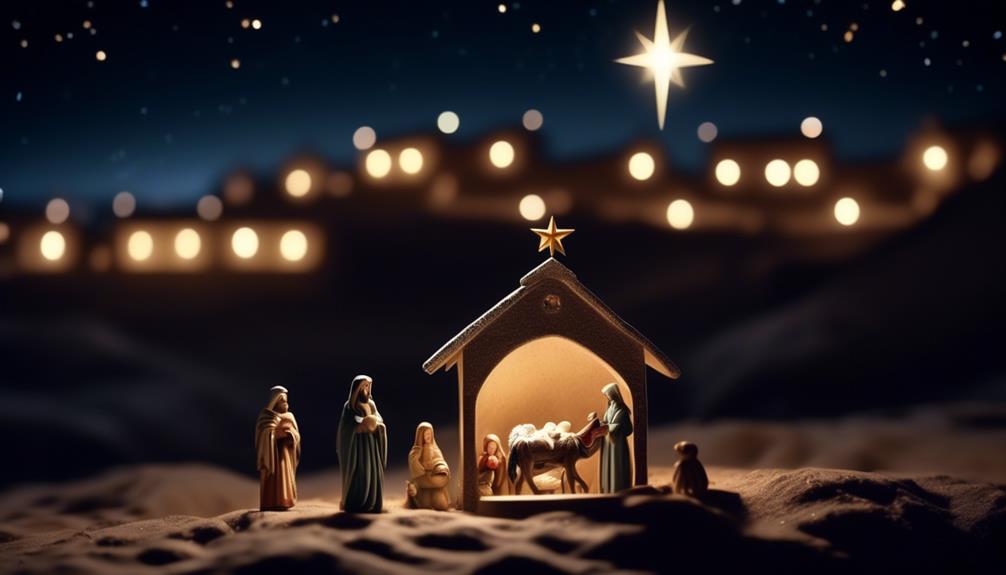The visit of the Wise Men to the infant Jesus is a well-known event in the biblical narrative, but the exact age of Jesus at the time remains a subject of debate and speculation. In order to shed light on this intriguing question, it is necessary to explore the various accounts found in the Bible, examine the historical context and cultural significance surrounding the event, and consider the perspectives of scholars who have devoted their lives to unravelling this mystery. As we embark on this journey to uncover the truth, we may discover surprising insights and find ourselves pondering the significance of Jesus’ age when the Wise Men came.
Key Takeaways
- The age of Jesus when the Wise Men came is not explicitly mentioned in the Gospel accounts, leading to scholarly debate and speculation.
- Jewish tradition suggests Jesus might have been around the age of 13 when the Wise Men visited.
- The gifts of gold, frankincense, and myrrh given by the Wise Men hold symbolic meanings related to Jesus’ identity as the King, Priest, and Savior.
- Jesus’ age during the visit of the Wise Men emphasizes his role as the fulfillment of prophecies and highlights the universal nature of his kingship.
Biblical Accounts of Jesus’ Age

In the biblical accounts, there is a significant lack of explicit information regarding Jesus’ age when the Wise Men came to visit him. However, through careful biblical interpretation, symbolism, and prophecy, we can glean some insights into this enigmatic aspect of Jesus’ life.
Firstly, let us consider the scriptural references. The Gospel of Matthew is the primary source that mentions the visit of the Wise Men, also known as the Magi or the Three Kings. However, Matthew does not provide a specific age for Jesus at the time. This lack of information has led scholars to delve deeper into the historical context and symbolic significance of the event.
In Jewish tradition, a child became a “son of the commandment” or bar mitzvah at the age of 13. This age marked the transition from childhood to adulthood, where a young Jewish boy was considered responsible for observing religious laws. Some scholars speculate that Jesus might have been around this age when the Wise Men came, symbolically signifying his role as the fulfillment of the law and the prophets.
Furthermore, the visit of the Wise Men is often seen as the fulfillment of Old Testament prophecies. Isaiah 60:3 speaks of nations coming to the light of the Messiah, and Psalm 72:10 mentions the kings of Tarshish and of distant shores bringing tribute to the Messiah. The arrival of the Wise Men, representing different nations, offering gifts to Jesus, suggests the universality of his kingship and the fulfillment of these prophecies.
While the biblical accounts do not provide a precise age for Jesus when the Wise Men came, a careful analysis of scripture, symbolism, and prophecy offers valuable insights into the significance of this event. It highlights Jesus’ role as the fulfillment of the law and the prophets and emphasizes the universal nature of his kingship.
Historical Context and Cultural Significance
The historical context and cultural significance surrounding the visit of the Wise Men to Jesus provide a profound understanding of the event’s impact on both biblical narratives and the broader religious landscape. While the exact historical accuracy of the Wise Men’s visit remains a subject of debate among scholars, the symbolism of their gifts carries deep religious and cultural significance.
In the Gospel of Matthew, the Wise Men, also known as the Magi, are described as astrologers from the East who journeyed to Jerusalem in search of the newborn King of the Jews. Their arrival in Bethlehem, guided by a star, is seen as the fulfillment of Old Testament prophecies regarding the coming Messiah.
The three gifts presented by the Wise Men – gold, frankincense, and myrrh – hold symbolic meanings that reflect Jesus’ identity and mission. Gold, a precious metal associated with kingship and wealth, signifies Jesus’ royal status as the King of Kings. Frankincense, an aromatic resin used in religious rituals, symbolizes Jesus’ divine nature and his role as the High Priest who offers intercession between God and humanity. Lastly, myrrh, a fragrant spice used in burial rituals, foreshadows Jesus’ eventual death on the cross and his sacrificial mission.
Beyond their individual symbolism, the gifts of the Wise Men also reflect the broader cultural context of the time. Gold, frankincense, and myrrh were highly valued commodities in the ancient world, often associated with wealth, power, and religious devotion. By offering these gifts to Jesus, the Wise Men acknowledged his significance and paid homage to him as a divine and kingly figure.
The visit of the Wise Men to Jesus holds immense historical and cultural significance, both within the biblical narratives and in the broader religious landscape. While the precise historical accuracy of the event may be difficult to ascertain, the symbolism of the gifts serves as a powerful reminder of Jesus’ identity as the King, Priest, and Savior. The story of the Wise Men continues to resonate with believers, inspiring devotion and offering profound insights into the nature of Christ’s mission and the significance of his birth.
The Journey of the Wise Men

Embarking on a perilous journey guided by celestial signs, the Wise Men ventured across vast distances to seek the newborn King of the Jews. Their journey, which is described in the Gospel of Matthew, is a testament to their faith and determination. As they traveled, they carried with them gifts of gold, frankincense, and myrrh, each holding deep symbolic meaning.
The table below provides a deeper understanding of the gifts and their significance:
| Gifts | Symbolism |
|---|---|
| Gold | Represents kingship and wealth. It signifies that Jesus is the King of Kings. |
| Frankincense | Represents divinity and worship. It symbolizes that Jesus is the Son of God and deserving of our adoration. |
| Myrrh | Represents death and sacrifice. It foreshadows Jesus’ future crucifixion and the ultimate sacrifice he would make for humanity. |
The Wise Men’s journey was guided by a star, which held great significance. In the ancient world, stars were often associated with divine intervention and served as signs of divine favor or impending events. The star that the Wise Men followed was no exception. It led them to Bethlehem, where they found the baby Jesus and presented their gifts.
The star’s appearance and its role in guiding the Wise Men has sparked much speculation and debate. Some scholars propose that it may have been a supernova, a planetary conjunction, or a miraculous celestial phenomenon. While the exact nature of the star remains uncertain, its significance lies in its ability to lead the Wise Men to Jesus, marking the fulfillment of prophecies and the recognition of Jesus as the long-awaited Messiah.
Scholars’ Perspectives on Jesus’ Age
As the Wise Men completed their arduous journey and presented their gifts to the newborn King of the Jews, scholars have sought to determine the age of Jesus during this significant encounter. The question of Jesus’ age at the time of the Wise Men’s visit has sparked scholarly debates and led to the exploration of historical evidence.
- Lack of explicit biblical evidence: The Gospel accounts do not provide a clear indication of Jesus’ exact age when the Wise Men arrived. The lack of specific details leaves room for interpretation and speculation among scholars.
- Historical context: To determine Jesus’ age, scholars often analyze the historical context surrounding the visit of the Wise Men. They consider factors such as the reign of King Herod, who ordered the massacre of infants in an attempt to eliminate the newborn Messiah. This event is believed to have occurred shortly after the Wise Men’s visit, leading some to estimate Jesus’ age as a toddler or young child.
- Scriptural clues: While the Bible does not explicitly state Jesus’ age, there are scriptural clues that can be examined. For example, Matthew’s Gospel mentions that the Wise Men found Jesus in a house, not a stable. This suggests that some time had passed since his birth, possibly indicating that Jesus was older than a newborn.
Scholars continue to engage in lively discussions and debates regarding the age of Jesus during the visit of the Wise Men. While historical evidence and scriptural clues offer insights, the exact age of Jesus at that moment remains a topic of speculation and interpretation. Nonetheless, these scholarly debates contribute to our understanding of the life and times of Jesus Christ.
Uncovering the Truth: How Old Was Jesus?

To accurately determine the age of Jesus during the visit of the Wise Men, a comprehensive analysis of scriptural references, historical context, and scholarly debates is necessary. While biblical accounts do not explicitly state Jesus’ age at the time, various historical evidence and religious interpretations provide some insight.
One approach to estimating Jesus’ age is to examine the accounts of the Wise Men in the Gospel of Matthew. According to Matthew 2:1-2, the Wise Men arrived in Jerusalem and inquired about the newborn king. King Herod, upon hearing this, ordered the execution of all male children aged two years and younger in Bethlehem, based on the information he obtained from the Wise Men regarding the time of the star’s appearance. This suggests that Jesus was likely younger than two years old when the Wise Men visited.
However, other scholars argue that Jesus could have been older. Matthew 2:16 states that Herod ordered the execution of all male children aged two years and younger “according to the time which he had diligently inquired of the Wise Men.” This indicates that the Wise Men’s journey to Bethlehem may have taken some time, possibly several months or even a year. Therefore, Jesus could have been older than two years at the time of their visit.
Religious interpretations also play a role in determining Jesus’ age. Some traditions believe Jesus was still an infant when the Wise Men arrived, while others propose that he could have been a toddler or young child. These interpretations are based on theological perspectives and cultural understandings.
Frequently Asked Questions
What Were the Names of the Wise Men Who Visited Jesus?
The visit of the wise men to Jesus holds great significance in Christian tradition. Scripture does not provide the names of the magi, but they are commonly referred to as Melchior, Caspar, and Balthazar, symbolizing different regions and races.
How Did the Wise Men Know That Jesus Was the Messiah?
The recognition of Jesus as the Messiah by the wise men holds great significance in both religious and historical contexts. Their visit not only confirmed his divine status but also set in motion a series of events that would forever change the course of history.
What Gifts Did the Wise Men Bring to Jesus?
The wise men brought gifts of gold, frankincense, and myrrh to Jesus. These gifts held symbolic meaning, representing Jesus’ kingship, divinity, and eventual sacrifice. Their visit to Jesus holds historical significance as it fulfilled prophecies and affirmed his identity as the Messiah.
Did the Wise Men Visit Jesus in a Stable or a House?
The visit of the wise men to Jesus holds significant biblical and historical importance. While the question of whether they visited Jesus in a stable or a house is debated, the focus should be on the spiritual significance of their encounter.
How Did the Wise Men’s Visit Impact the Lives of Mary and Joseph?
The visit of the wise men had a profound impact on Mary and Joseph, transforming their lives and setting them on an emotional journey of faith, sacrifice, and fulfillment. It brought them joy, awe, and the realization of the divine purpose of their son’s birth.
Conclusion
In conclusion, through analyzing biblical accounts, historical context, and scholars’ perspectives, it is challenging to determine the exact age of Jesus when the wise men came. However, considering the cultural significance and the journey undertaken by the wise men, it is believed that Jesus was likely a young child or toddler at the time. Unraveling this mystery is like peeling back the layers of an onion, revealing a deeper understanding of Jesus’ early years.

